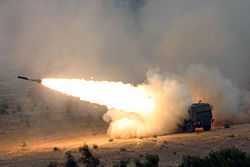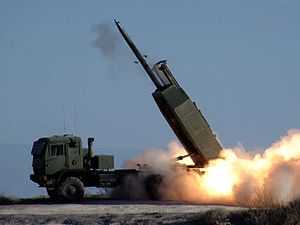HIMARS
| M142 High Mobility Artillery Rocket System | |
|---|---|
|
HIMARS at the White Sands Missile Range in January 2005. | |
| Type | Rocket artillery, Anti-aircraft, Tactical ballistic |
| Place of origin | United States of America |
| Production history | |
| Manufacturer |
Lockheed Martin Missiles & Fire Control BAE Systems (Chassis) |
| Unit cost | $3.48 million (2014)[1] |
| Specifications | |
| Weight | 24,000 lb (10,900 kg) |
| Length | 7 m (23 ft 0 in) |
| Width | 2.4 m (7 ft 10.5 in) |
| Height | 3.2 m (10 ft 6 in) |
| Crew | 3 |
|
| |
| Traverse | 360 |
| Rate of fire | 1, 2, 4, All 6 |
| Maximum firing range | 2–300 kilometres (1.2–186.4 mi) |
|
| |
| Armor | light |
Operational range | 480 km (298 mi) |
| Speed | 85 km/h (52.8 mph) |
| Accuracy | Guided |
The M142 High Mobility Artillery Rocket System (HIMARS) is a U.S. light multiple rocket launcher mounted on a standard Army Medium Tactical Vehicle (MTV) truck frame.
The HIMARS carries six rockets or one MGM-140 ATACMS missile on the U.S. Army's new Family of Medium Tactical Vehicles (FMTV) five-ton truck, and can launch the entire Multiple Launch Rocket System Family of Munitions (MFOM). HIMARS is interchangeable with the MLRS M270A1, carrying half the rocket load.
The launcher is C-130 transportable. The chassis is produced by BAE Systems Mobility & Protection Systems (formerly Armor Holdings Aerospace and Defense Group Tactical Vehicle Systems Division), the OEM of the FMTV. The rocket launching system is produced by Lockheed Martin Missiles & Fire Control.
Deployment
The M142 High Mobility Artillery Rocket System (HIMARS) is the light, wheeled version of the M270 Multiple Launch Rocket System (MLRS). The HIMARS utilizes the same pod as the M270 MLRS uses. A pod can hold six rockets or a single missile. The windows are made of glass and layers of sapphire.[2]
18th Field Artillery Brigade (Airborne) at Fort Bragg, North Carolina was the initial army test bed unit for the M142 HIMARS. C Battery, 3rd Battalion, 27th Field Artillery Regiment began field testing 3 HIMARS prototypes in all types of training events and environments in 1998 as a residual of the Rapid Force Projection Initiative (RFPI) Advanced Concept Technology Demonstration (ACTD). In 2002, the United States Marine Corps arranged with the United States Army to acquire 40 of the systems. Fielding began in 2005. In July 2007, Marines from Fox Battery 2nd Battalion 14 Marine Regiment were deployed to the Al Anbar province of Iraq. This is the first Marine unit to use the HIMARS in combat.
HIMARS was also tested as a common launcher for both artillery rockets and the surface-launched variant of the AMRAAM anti-aircraft missile.[3]
Singapore
As of September 2007, the Singapore Army proposed to acquire HIMARS systems. The package includes 18 HIMARS launchers, 9 FMTV 5-Ton Trucks and XM31 unitary HE GMLRS pods, plus associated support and communications equipment and services. This proposed package is notable for not involving the M-26 unguided MLRS rockets. In late 2009, Singapore took delivery of the first HIMARS firing unit and achieved Full Operational Capability. The 23rd Battalion, Singapore artillery commissioned its HIMARS battery on 5 September 2011. It marks the first fully GPS-guided HIMARS unit.
Operational history
On February 14, 2010, the International Security Assistance Force (ISAF) for Afghanistan indicated in a press release that it was thought that two rockets fired from a HIMARS unit fell 300 metres short of their intended target and killed 12 civilians during Operation Moshtarak. ISAF suspended the use of the HIMARS until a full review of the incident was completed.[4] A British officer later said that the rockets were on target, that the target was in use by the Taliban, and use of the system has been reinstated.[5] Reports indicate that the civilian deaths were due to the Taliban's use of an occupied dwelling, the presence of civilians at that location was not known to the ISAF forces.[6] An October 21, 2010 report in the New York Times credited HIMARS with aiding the NATO offensive in Kandahar by targeting Taliban commanders' hideouts, forcing many to flee to Pakistan, at least temporarily.[7]
Specifications

| Crew: | 3: Gunner, Driver, and Launcher Chief |
| Weight: | 11,000 kg (24,000 lb) |
| Length: | 7m |
| Width: | 2.4m |
| Height: | 3.2m |
| Vehicle Range: | 480 km |
| Road Speed: | 85 km/hour |
| Armament: | 6 x 227mm M270 series rockets or 1 MGM-140 ATACMS missile |
Related developments
Lockheed Martin UK and INSYS had jointly developed a demonstrator rocket artillery system similar to HIMARS for the British Army's 'Lightweight Mobile Artillery Weapon System/Rocket' (LIMAWS(R)) program. The system consisted of a single MLRS pod, mounted on a Supacat SPV600 chassis.[8] The LIMAWS(R) programs was cancelled in September 2007.[9]
Operators
- United States Army
- Active Duty
- 17th Field Artillery Brigade
- 5th Battalion 3rd Field Artillery Regiment
- 1st Battalion 94th Field Artillery Regiment
- 18th Field Artillery Brigade
- 3rd Battalion 27th Field Artillery Regiment
- 3rd Battalion 321st Field Artillery Regiment
- 214th Field Artillery Brigade
- 1st Battalion, 14th Field Artillery Regiment
- 17th Field Artillery Brigade
- Army National Guard
- 65th Field Artillery Brigade (UT ARNG)
- 5th Battalion 113th Field Artillery Regiment (NC ARNG)
- 45th Field Artillery Brigade (OK ARNG)
- 138th Field Artillery Brigade (KY ARNG)
- 3rd Battalion 116th Field Artillery Regiment (FL ARNG)
- 142nd Field Artillery Brigade (AR ARNG)
- 1st Battalion 181st Field Artillery Regiment (TN ARNG)
- 130th Field Artillery Brigade (KS ARNG)
- 2nd Battalion 130th Field Artillery Regiment(KS ARNG)
- 197th Field Artillery Brigade (NH ARNG)
- 3rd Battalion 197th Field Artillery Regiment
- 1st Battalion 182nd Field Artillery Regiment (MI ARNG)
- 115th Field Artillery Brigade (WY ARNG)
- 1st Battalion 121st Field Artillery Regiment (WI ARNG)
- 65th Field Artillery Brigade (UT ARNG)
- Active Duty
- United States Marine Corps
- Singapore Army (18)
- 23rd Battalion, Singapore Artillery (23 SA)[10]
- Jordanian Army (12)
Potential and future operators
The Department of National Defence is considering the purchase of HIMARS. The former Chief of the Land Staff, Lieutenant-General Andrew Leslie, said the plan to acquire rocket launchers was something that "would be considered much further down the road—possibly in the 2012 time frame.[11][12][13][14]
In December 2012, Qatar notified the U.S. of a possible Foreign Military Sale of 7 M142 HIMARS systems, as well as 60 M57 MGM-140 ATACMS Block 1A T2K unitary rockets and 30 M31A1 Guided Multiple Launch Rocket System (GMLRS) unitary rockets. The deal would cost an estimated $406 million.[15]
New Multiple Launch Rocket System. Program "Homar" Poland. Multiple Launch Rocket System Cooperation between Huta Stalowa Wola, ZM Mesko and Lockheed Martin.
Future substitute of the Teruel MRL.
See also
- List of U.S. Army Rocket Launchers by model number
- Astros II Multiple Launch Rocket System
- BM-27 Multiple Launch Rocket System
- BM-30 Multiple Launch Rocket System
- M-26 artillery rocket
- M270 Multiple Launch Rocket System
- SR5
- A-100
- A-200
- TOS-1 Multiple Launch Rocket System
- 9A52-4 Tornado
References
- ↑ Oestergaard, Joakim. "About the HIMARS". Aeroweb. Retrieved 28 April 2015.
- ↑ "Saint-Gobain delivers sapphire-engineered transparent armor" UPI / press release, 5 November 2013. Accessed: 19 June 2014.
- ↑ HIMARS Launcher Successfully Fires Air Defense Missile
- ↑ ISAF Weapon Fails to Hit Intended Target, 12 Civilians Killed
- ↑ "Operation Moshtarak: missiles that killed civilians 'hit correct target'". Telegraph. 2010-02-16. Retrieved 2010-07-07.
- ↑ "Artillery: It Wasn't Me". Strategypage.com. 2010-02-18. Retrieved 2010-07-07.
- ↑ Coalition Forces Routing Taliban in Key Afghan Region
- ↑ Missiles and Fire Support at DSEi 2007
- ↑ UK cancels LIMAWS Gun to pay for operations, Janes.com, 04 September 2007
- ↑ "Integration at its best". Ministry of Defence (Singapore). 2010-01-04. Retrieved 1 May 2011.
Men from 23 SA had commenced training with the US Army's HIMARS in March 2009.
- ↑ "CASR Background — Artillery — Long-Range Precision Rocket System". Canadian American Strategic Review. Retrieved 2009-11-11.
- ↑ "Canadian army shopping for rocket launchers". CTV. 2009-01-08. Retrieved 2009-11-11.
- ↑ "Canada Seeks MLRS Rocket Systems". Defense Industry Daily. 2009-01-07. Retrieved 2009-11-11.
- ↑ "Long Range Precision Rocket System (LRPRS) – A Multiple- Launch Rocket System – MERX LOI Letter of Interest Notice". Canadian American Strategic Review. Retrieved 2009-11-11.
- ↑ Qatar Requests Sale of HIMARS, ATACMS and GMLRS - Deagel.com, December 24, 2012
External links
- M142 HIMARS Lockheed Martin High Mobility Artillery Rocket System(Army recognition)
- https://fas.org/man/dod-101/sys/land/himars.htm
- Army-Technology.com: HIMARS
- Lockheed-Martin: HIMARS
- DoD Press Release on Proposed HIMARS Sale to Singapore
- Information about M26/M30/M31 MLRS rockets on designation-systems.net
- MERX Release on Proposed HIMARS to the Canadian Forces in 2010
- Use of HIMARS system suspended in Afghanistan after 12 civilians killed by 300m targeting error
| |||||||||||||||||||||||||||||||

